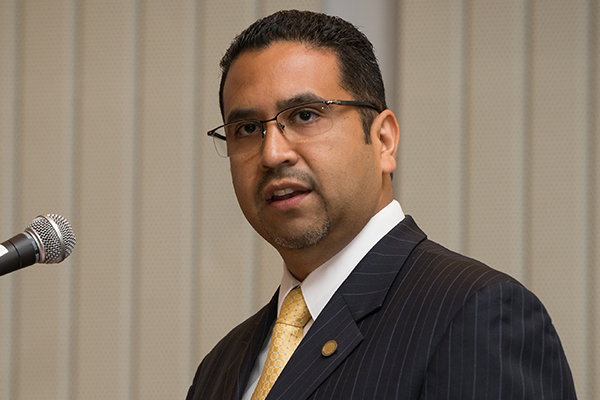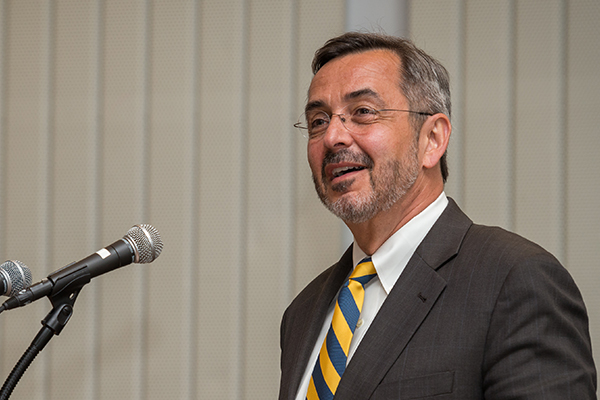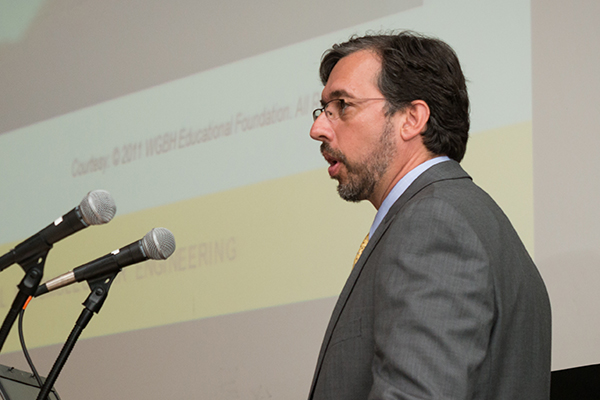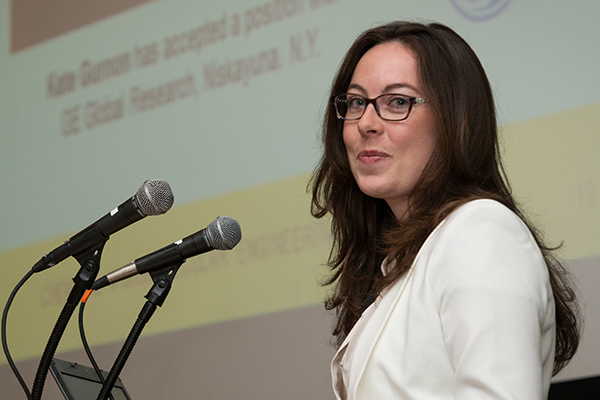

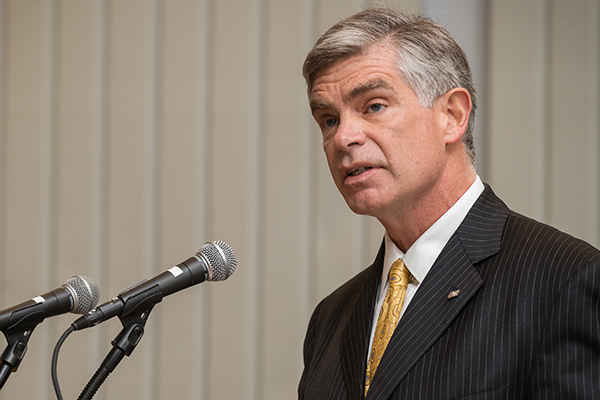
Board of Trustees
Class of 2018, strategic planning efforts previewed at board meeting
2:29 p.m., May 14, 2014--Meeting the challenges of a changing academic environment and a look at the Class of 2018 were among topics discussed during the University of Delaware Board of Trustees’ semiannual meeting held Tuesday, May 13, in the Trabant University Center.
President Patrick Harker said UD, which is undertaking a strategic planning initiative, must be at the forefront of innovative approaches to meet an array of challenges that include changing demographics and the increasing role of technology in the world of higher education.
Campus Stories
From graduates, faculty
Doctoral hooding
“I’d like to talk briefly about this unique time in the life of UD — in the life of American higher education, the life of the public university, the research university and the land-grant university,” Harker said. “The University is all of these things, and we’re embarking now on a plan not only to define UD’s place in this education landscape, but to define the landscape itself.”
Challenges facing UD and academia nationwide include high costs and changing demographics, with an ever-increasing number of students coming from low-income households and a decline in the overall number of high school students in UD’s traditional major marketing areas, Harker said.
“We can’t serve this new population the same way we once served a more homogeneous student body,” Harker said. “We need new strategies, new engagement and new energy.”
Harker also cited the need for UD to remain connected to its land- grant charge to conduct democratic research initiatives.
“Great American research universities like UD can no longer merely incubate innovation. We must connect those innovations with industry and connect academics with entrepreneurs,” Harker said. “We have to turn our ideas into products, processes and technologies that grease social and scientific gains and that create jobs and drive economic growth.”
In noting the work of several UD faculty members recently garnering attention in major media outlets, including CNN and NBC Nightly News, Harker said the University needs to be seen as an institution that makes a difference in the lives of people down the street and across the country.
“We have to matter to these people because this is our land-grant mission, to lift people up, to lift communities up and to be a source, a wellspring, of the ideas that contribute to the public interest and the public good,” Harker said. “I’m excited to begin our work — to find and forge UD’s new path alongside you.”
The Class of 2018
Jose Aviles, director of admissions, provided a look at the Class of 2018, and the 4,000-plus students projected to arrive on campus this fall.
“Our story this year is one of extraordinary change,” Aviles said. “I believe our new direction has set the foundation for us to continue our journey in the interest of achieving greatness.”
Goals at the beginning of the recruiting season included bringing in a class of 3,800 students with the appropriate mix of residents and non-residents and improving diversity while attracting a highly talented class from across the state and the nation and around the globe, Aviles said.
“I can proudly and unequivocally say we have met every goal,” Aviles said. “Our fall recruitment efforts produced the second-largest applicant pool in UD history, at 26,461, a 2 percent increase over last year.”
Applicants came from 48 states and 82 countries, including over 3,000 applicants from the First State, Aviles said.
“This perhaps may be the most talented pool of Delawareans in UD history,” Aviles said. “Resident students who applied had an improved SAT profile that was up 17 points. The strength of this pool reflects my staff’s tireless outreach to every high school in the state.”
Aviles credited initiatives such as the College Readiness Scholars Institute (CSRI) partnership with the Christina School District.
“The purpose of CRSI is to intentionally address the challenges faced by traditionally underprepared, underserved and often forgotten about students,” Aviles said. “This requires the deep work of transforming students by shifting paradigms, developing values consistent with academic achievement and helping students see a vision for academic success that includes them in it.”
Globe-spanning efforts including an Asian component that saw first- time recruiting visits to India and Pakistan, with continuing efforts in the Middle East, Latin America and Canada. The result was a 43 percent increase in domestic applications and a 61 percent rise in international applications.
Diversity efforts include reaching out to low-income, first generation students, as well as the most talented international applicants, Aviles said.
“We can report that we have exceeded last year’s historic success and recruited the most diverse applicant pool in UD history with 28 percent of the applicants coming from historically underrepresented groups,” Aviles said. “Our Asian, African American, Hispanic and multi-ethnic sub-groups also represented a stronger SAT profile than the previous year.”
Aviles also noted that the honors applicant pool of 5,835 is the highest and most diverse in UD history.
Provost’s report
UD Provost Domenico Grasso recognized outstanding student and faculty achievements in his presentation to the board.
Grasso also updated trustees on the progress of initiatives designed to build on the achievements of UD’s Path to Prominence strategic plan adopted in 2008.
“We took our first significant step in February, when we appointed an executive committee chaired by Charles Riordan, our vice provost for research,” Grasso said. “We hosted our first town hall meeting and the next one is scheduled for May 29. We’ve also created three working groups made up of faculty and staff, with each exploring an important question.”
Focus areas include identifying the best models for the new American research university; identifying areas of state, national or global consequence where UD is best positioned, now or in the future, to engage through research, teaching and service initiatives and through new and existing alliances; and how to sustain and accelerate the advances made under the Path to Prominence, Grasso said.
Applied research
Norman Wagner, Alvin B. and Julia O. Stiles Professor of Chemical and Biomolecular Engineering, presented an overview of the work he and his students are doing in understanding and developing protective materials based on shear thickening fluid (STF).
Wagner was joined during the presentation by Kate Gurnon, who will be receiving her doctorate in engineering at the 2014 Spring Commencement on May 31, and Keyi Xu, a senior in the College of Engineering.
A recent application for the research is in the development of puncture-resistant surgical gloves through the University spin-off company STF Technologies LLC.
Board actions
At the meeting, the trustees approved several resolutions, including:
- Dining rates were increased by an average rate of 3.5 percent and residence hall rates by an average of 3.0 percent, effective with the fall semester;
- The new student orientation fee will be increased from $125 to $145, effective with the fall semester, to cover the cost of the math placement exam required for all new students;
- The student comprehensive fee will be reduced from $395 to $375 per semester, effective with the fall semester. The $50 fee per semester for part-time students and the $50 fee per winter and summer sessions for all students shall remain the same;
- The Student Health Services fee will be decreased from $252 per semester to $227 per semester, effective with the fall semester. The $88 fee for summer session and $68 fee for winter session will remain the same;
- The University Student Center fee of $119 per semester will remain the same, effective with the fall semester; and
- The recently renovated building at 44 Kent Way, formerly the Blue and Gold Club, is renamed the Wright House, in honor of the family who gave it to the University.
- The Department of Psychology is changed to the Department of Psychology and Brain Sciences.
- The president was authorized to confer degrees at Commencement on May 31.
In addition, the trustees reelected to one-year terms the board's officers: A. Gilchrist Sparks III, chair; John R. Cochran and Mary Jane Wills, vice chairs; and Carey M. Koppenhaver, secretary-treasurer. Recent graduate trustee Michelle Barineau, was reelected to a one-year term, and trustee James C. Borel, was reelected to a six-year term.
Article by Jerry Rhodes
Photos by Kathy F. Atkinson




